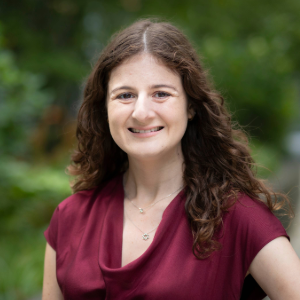
October 2025 Newsletter

October 2025 Newsletter

Student Profile
Arielle Smith is a PhD student studying clinical psychology in the Lab for Scalable Mental Health. Under the direction of Jessica Schleider, PhD, associate professor of Medical Social Sciences, Smith works to increase access to eating disorder treatment.
Where is your hometown?
I was born in Chicago (at Northwestern Medicine) and I grew up in San Jose, California.
What sparked your interest in science or medicine?
I knew I wanted to be a scientist when I was in middle school. I had a fantastic science teacher who encouraged my friends and I to submit a project to our county’s science fair and got us connected with a lab at a local university who let us use their equipment. Back then, I was motivated by my love for animals and had an interest in microbiology, so we conducted a project comparing the bacteria in the mouths of dogs and horses. Fast forward to my time in college at Washington University in St. Louis — my passion for mental health inspired by my personal experiences led me to pursue research in psychology, and I was immediately hooked.
What are your research interests?
My mission is to increase access to eating disorders treatment through the development and implementation of scalable, online resources. I’m particularly interested in investigating online single-session interventions (SSIs) that can produce small but meaningful, immediate changes in body image and mood that cascade into long-term reductions in eating disorder symptoms. The online SSI approach is unique because these tools can be made widely available for people to access anytime, anywhere (for free in all my lab’s work). Also, since research shows that people often only attend one therapy session or use digital mental health programs just one time, SSIs are intentionally designed to maximize the benefits people can gain from briefly using helpful tools. My SSI research is focused on youth, so another important part of my work is making sure that young people can access support without involving their parents if they prefer not to.
What are you currently working on?
I recently finished a randomized controlled trial testing a SSI called Project Body Neutrality that teaches youth the idea that you don’t always have to like the way your body looks but that you can improve how you feel by appreciating the things that your body helps you enjoy in life. My team and I found that youth who are at-risk for developing an eating disorder had significantly greater reductions in symptoms three months after completing Project Body Neutrality compared to the control group. Since the SSI was helpful, we are now working with a nonprofit called Koko to identify youth who appear to be engaging with harmful eating disorder content on social media and offer them support through Project Body Neutrality. For my dissertation, I plan to use implementation science to study more ways we can get SSIs that help people recover from eating disorders out into the real world.
Please tell us about a defining moment in your education at Feinberg thus far.
Over the summer, I began my clinical training in the Learning, Attention, and Developmental Diagnostic (LADD) clinic directed by Dr. Jason Washburn. A patient came in for neuropsychological testing, and it became clear to me during our diagnostic interviews that they had been struggling immensely with their body image and disordered eating for decades. Unfortunately, they had not received adequate eating disorder treatment, and they instead appeared to be receiving harmful messages from a weight loss program that likely worsened their eating disorder symptoms. I was able to provide psychoeducation about the symptoms I assessed, validate their concerns, and refer them to eating disorder treatment. Hearing about how this patient’s eating disorder symptoms were left underrecognized for so long (in part due to weight stigma) was a tangible reminder about why I am doing research to expand access to eating disorder care with a focus on reaching those who too often get overlooked.
What do you hope to do with your degree?
I’m only in the second year of my PhD program, so I’m still thinking about it, but I am leaning towards a career in an academic medical center where I can keep doing impactful research as well as provide psychotherapy to patients with eating disorders.